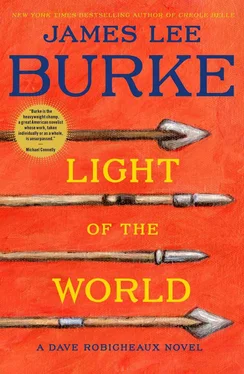“Stand up.”
“No, I won’t do that. I’ll get up and leave after you’re gone. In the meantime, I’m sorry for the harm I’ve caused you.”
“I’m overwhelmed at your humility. Is this hers? Must be. Her whorehouse-purple lipstick is on it,” Caspian said. He picked up Felicity’s plastic cup of Coca-Cola and poured it slowly on top of Clete’s head, the crushed ice sliding down his forehead and face onto his shirt and shoulders.
Clete wiped his hair and face again. “She’s a good woman,” he said. “I think you’re a lucky man.”
“You’re just going to sit there, in front of all these people, and not defend yourself? Stand up. I’m not afraid of you.”
“You don’t have any reason to be,” Clete said. “I’m leaving now. Stay away from me. Don’t take your anger out on your wife. If you do, you’ll be walking around on stumps.”
He put on his porkpie hat and walked down the street toward his Caddy, his pale blue sport coat striped with tea and Coca-Cola and grains of melting ice, everyone at the other tables too embarrassed to look directly at him.
Two hours later, he called me from the only saloon in Lolo, a biker hangout, one often crowded during the summer, particularly in the run-up to Sturgis. “Come on down. I’ll buy you a lime and soda,” he said.
I could hear music and a clatter of pool balls in the background. “You sound like you’re half in the bag.”
“My mind is crystal-clear. That’s my problem. When my mind is clear, I go into clinical depression.”
“Come back to the cabin, Clete.”
“No, I dig it here, big mon. Right now I’m watching this fat slob with an earring through his eyebrow shoot nine ball.” He took the phone away from his ear. “Yeah, I’m talking about you. That last shot was a rocket. You’re beautiful, man. I’ve never doubted the genetic superiority of the white race.”
“Are you crazy?” I said.
“When did I ever claim to be normal? Are you coming down here or not?”
“Did something happen between you and Felicity Louviere?”
“Dave, I feel like killing myself. I’ve never felt worse in my life.”
How’s that for getting a jump-start on the evening? I got in my pickup and drove down to the saloon. Two rows of motorcycles were parked outside. Clete was standing at the far end of the bar by himself, a longneck Bud and three full jiggers of whiskey in front of him. The bartender stopped me. “You know the guy down there?”
“That’s Clete Purcel. He’s an old friend. My name is Dave Robicheaux. I’m a cop,” I said. “He’s a PI. He doesn’t mean any harm.”
“He needs to go home and take a nap. Maybe start the day over.”
“I’ll see what I can do.”
“The guys at the pool table paid for those three whiskies and the Budweiser. They were all in Afghanistan or Iraq.”
“There won’t be any trouble,” I said.
I ordered a Dr Pepper and carried it down to the end of the bar. The back of Clete’s neck looked oily and red and pocked with acne scars in the neon glow of the beer sign on the log wall. His coat was folded on top of the bar, with his porkpie hat placed crown-down on it. “What’s the haps, noble mon?” he said.
“You called me on your cell phone.”
“I did? What did I say?”
“You don’t remember?”
He squeezed his eyes shut and opened them and looked into space. “I feel like my brain has been soaked in a septic tank.”
“Did Felicity Louviere cut you loose?”
“You know how to turn a phrase, Streak.”
“You were talking about killing yourself. What am I supposed to say?”
He told me everything that happened at the outdoor table under the awning, on a breezy day in early summer, in the midst of an alpine environment that you would consider the perfect backdrop for star-crossed lovers. When he told me what Caspian had done, I had to drop my eyes and clear my throat and pick up my glass of Dr Pepper and cracked ice and cherries and orange slices, and drink from it and pretend that nothing Clete had told me was that serious in nature. At the same time, I wanted to tear Caspian Younger apart.
“I think you did the right thing,” I said.
“Right thing in what way?”
“Walking away. Taking the heat for his wife. You don’t lower yourself to the level of a guy like that.”
“That’s not what I was asking.”
“Then what’s the question?”
“You know what the question is.”
“You mean is a certain someone trying to do a mind-fuck on you?”
“In a word, yeah,” he said.
“How would I know?”
“You’re smarter about women than I am.”
“I say blow it off. Let go of her.”
“She bothers me. I can’t get her out of my head.”
“You don’t think you deserve a good woman’s love. That’s the real problem, Clete. That has always been the problem.”
“Quit it,” he replied. He tipped one of the shot glasses to his mouth and drank it down, then upended the Bud and swallowed for a long time, until foam ran down the inside of the bottle’s neck into his throat. He set the bottle on the bar, the alcohol glowing in his cheeks. “Somehow Surrette is a player in all this, isn’t he? With Angel Deer Heart, with Caspian Younger, and maybe with the old man.”
“Take it to the bank.”
“Remember Randy’s Record Shop? Randy would come on the air at midnight and say, ‘Hang on, chil’en. We’re coming to you direct from Gatlinburg.’ Then he’d kick off the show with ‘Swanee River Boogie’ by Albert Ammons. It was great back then, wasn’t it?”
“You bet,” I said, avoiding his eyes and the chemically induced glow in his face.
“Maybe it’s still the top of the sixth,” he said. “You think?”
“Why not,” I said, falling into the old lie that both of us told ourselves.
He looked at the two remaining whiskies on the bar, then put on his porkpie hat and his stained sport coat and laid his big arm heavily across my shoulders and walked with me through the front door and out into the sunlight.
“You think she meant that about running off to a ranch in Reno?” he said.
This time I had nothing more to say.
That evening after supper, Alafair and Albert and I watched the network and the local news. The lead story locally was about a twenty-six-year-old single woman who had failed to show up at the café where she worked as a waitress on Interstate 90, east of Lookout Pass. Her name was Rhonda Fayhee. Her automobile was found parked in front of her small frame house, the keys in the ignition. All the windows and doors in the house were locked and the doors dead-bolted from the inside. Her purse and wallet were on the dining room table. Her three cats were inside the house, their water bowls half full. Dry cat food was scattered on a piece of newspaper someone had spread on the kitchen floor.
On camera, a sheriff’s detective said the pink uniform she had probably worn to work the previous night had been washed in a sink and put on a coat hanger in the bathroom. Anyone with knowledge about her whereabouts was asked to call the Mineral County Sheriff’s Department.
Wyatt Dixon was sitting in the living room of Bertha Phelps’s apartment, ten floors above the old vaudeville theater called the Wilma, with a magnificent view of the bandstand and the merry-go-round in the park and the river that flowed high and roiling through the city. The light was fading in the sky, and he could see stars high above the pink and lavender afterglow on the rim of the mountains far to the west. Wyatt’s mind was not on the view. When he looked up at Bertha’s silhouette as she watered her window plants, he felt the same conflict of emotions that had always beset him whenever he placed his trust in others.
Читать дальше












